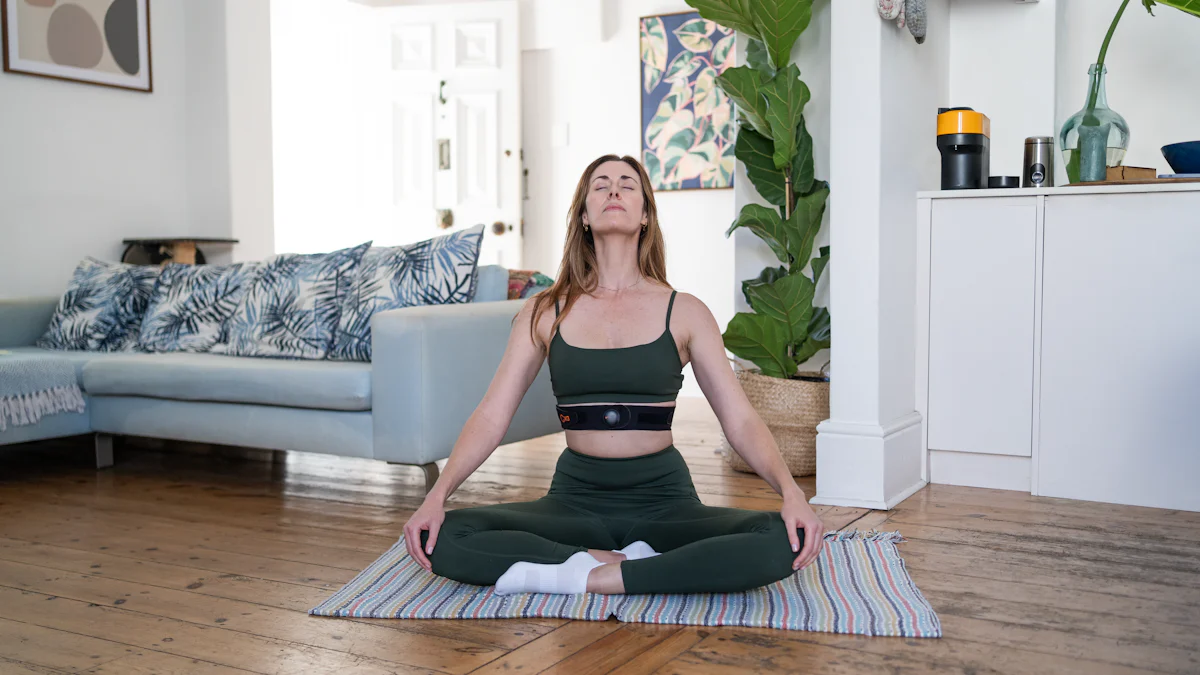How to Use Mindfulness for Effective Self-Care

Mindfulness transforms self-care into a powerful tool for well-being. Practicing mindfulness enhances focus, self-awareness, and emotional resilience. These benefits lead to happier and healthier lives. Mindfulness helps manage stress and burnout, promoting wellness. Integrating mindfulness into daily life creates opportunities for growth and healing. Simple practices like mindful breathing or meditation offer profound effects. Discover how to use mindfulness for self-care and unlock a path to balance and peace.
Understanding Mindfulness
Definition of Mindfulness
Mindfulness involves being fully present and engaged in the moment. This practice encourages awareness of thoughts, feelings, and surroundings without judgment. Mindfulness allows individuals to experience life more deeply and authentically.
Origins and History
Mindfulness has roots in ancient Eastern traditions. Buddhist practices have long embraced mindfulness as a path to enlightenment. Western culture began integrating mindfulness in the late 20th century. Jon Kabat-Zinn played a pivotal role by developing the Mindfulness-Based Stress Reduction (MBSR) program. This program brought mindfulness into mainstream healthcare.
Key Principles of Mindfulness
Mindfulness rests on several key principles. Awareness of the present moment forms the foundation. Acceptance plays a crucial role in allowing experiences without resistance. Non-judgmental observation helps cultivate compassion and understanding. Regular practice strengthens these principles and enhances mindfulness skills.
Benefits of Mindfulness
Mindfulness offers numerous benefits for overall well-being. Scientific research supports the positive impact of mindfulness on mental, physical, and emotional health.
Mental Health Benefits
Mindfulness reduces stress and anxiety. Studies show that mindfulness practice decreases symptoms of depression. Enhanced cognitive flexibility improves problem-solving and decision-making skills. Mindfulness fosters self-awareness and emotional regulation. These benefits contribute to improved mental health and resilience.
Physical Health Benefits
Mindfulness positively affects physical health. Regular practice can lead to better sleep quality. Mindfulness reduces blood pressure and boosts immune function. Physical well-being improves through mindful movement practices like yoga and tai chi. These activities promote relaxation and body awareness.
Emotional Well-Being
Mindfulness enhances emotional well-being. Practicing mindfulness increases happiness and life satisfaction. Mindfulness helps individuals develop healthier responses to stress. Emotional resilience grows stronger with consistent practice. Mindfulness fosters deeper connections and relationship satisfaction.
How to Use Mindfulness for Self-Care
Mindfulness transforms self-care into a nurturing practice. You can embrace mindfulness techniques to enhance well-being and find balance. Discover how to use mindfulness for self-care with these effective methods.
Mindfulness Techniques for Self-Care
Breathing Exercises
Breathing exercises offer a simple way to center yourself. Focus on your breath to calm the mind and reduce stress. Inhale deeply through the nose, hold briefly, and exhale slowly through the mouth. Repeat this process several times. This technique helps you stay present and grounded.
Meditation practices cultivate inner peace and awareness. Find a quiet space and sit comfortably. Close your eyes and focus on your breath or a calming word. Allow thoughts to pass without judgment. Regular meditation enhances emotional resilience and clarity. You will notice increased focus and reduced anxiety.
Meditation practices cultivate inner peace and awareness. Find a quiet space and sit comfortably. Close your eyes and focus on your breath or a calming word. Allow thoughts to pass without judgment. Regular meditation enhances emotional resilience and clarity. You will notice increased focus and reduced anxiety.
Mindful Movement
Mindful movement connects the body and mind. Activities like yoga or tai chi promote relaxation and flexibility. Move slowly and pay attention to each sensation. Feel the stretch and breathe deeply. This practice encourages physical health and emotional balance. Mindful movement helps you release tension and embrace tranquility.
Expert Testimony:
"The positive impact of infusing mindfulness-based stress reduction includes introducing the concept of mindfulness and practical methods for self-care." — Cashwell et al.
Understanding how to use mindfulness for self-care empowers you to lead a more fulfilling life. These techniques nurture both mind and body. Embrace mindfulness daily to unlock a path to peace and well-being.
Incorporating Mindfulness into Daily Routine

Mindful Eating
Techniques for Mindful Eating
Mindful eating transforms meals into moments of awareness. Focus on each bite to savor flavors and textures. Chew slowly and appreciate the nourishment. Avoid distractions like phones or TV during meals. Engage all senses to enhance the experience.
Benefits of Mindful Eating
Mindful eating promotes better digestion and satisfaction. Awareness of hunger cues helps prevent overeating. Enjoyment of food increases with focused attention. Mindful eating supports healthy weight management and fosters a positive relationship with food.
Mindful Walking
Steps to Practice Mindful Walking
Mindful walking connects you with the present moment. Start by choosing a quiet path. Walk slowly and notice each step. Feel the ground beneath your feet. Pay attention to your breath and surroundings. Allow thoughts to come and go without judgment.
Advantages of Mindful Walking
Mindful walking reduces stress and enhances mental clarity. Physical activity boosts mood and energy levels. Connection with nature fosters peace and relaxation. Regular practice improves focus and emotional well-being.
"Mindfulness practices promote positive psychological states and counteract stress-based issues."
Incorporate mindfulness into daily routines to enrich life. Simple practices like mindful eating and walking offer profound benefits. Embrace mindfulness to nurture body, mind, and spirit.
Overcoming Challenges in Mindfulness Practice

Common Obstacles
Distractions and how to manage them
Distractions often disrupt mindfulness practice. Acknowledge the presence of distractions without judgment. Redirect focus back to the breath or chosen point of concentration. Practice patience and persistence to strengthen attention over time. Create a quiet environment to minimize external interruptions. Consistent practice builds resilience against distractions.
Dealing with impatience
Impatience arises during mindfulness sessions. Recognize impatience as a natural response. Focus on the present moment to reduce frustration. Use deep breathing to calm the mind and body. Set small, achievable goals for each session. Celebrate progress to cultivate patience and perseverance.
"Mindfulness fosters greater self-compassion by allowing observation of experiences with kindness and understanding."
Staying Consistent
Setting realistic goals
Realistic goals encourage consistent mindfulness practice. Start with short sessions and gradually increase duration. Choose specific times each day for practice. Track progress to stay motivated and accountable. Flexibility in routine accommodates life's demands.
Creating a supportive environment
A supportive environment enhances mindfulness commitment. Share goals with friends or family for encouragement. Join mindfulness groups or classes for community support. Designate a peaceful space for practice at home. Incorporate mindfulness into daily activities for seamless integration.
"Regular mindfulness practice leads to calmness, focus, and healthier decisions."
Overcoming challenges in mindfulness practice requires dedication and adaptability. Embrace obstacles as opportunities for growth. Consistent practice transforms mindfulness into a powerful tool for self-care and well-being.
FAQs on Mindfulness and Self-Care
Addressing Common Questions
How long should I practice mindfulness daily?
Mindfulness practice can fit into any schedule. A few minutes each day can make a difference. Start with five minutes of focused breathing. Gradually increase the time as comfort grows. Consistency matters more than duration. Daily practice builds mindfulness skills over time.
Can mindfulness replace other forms of self-care?
Mindfulness complements other self-care practices. Each form of self-care addresses different needs. Physical activities like exercise boost energy and health. Emotional self-care involves expressing feelings and seeking support. Mindfulness enhances awareness and presence. Integrating mindfulness with other self-care methods creates a balanced approach.
"Self-care involves engaging behaviors or activities that promote health and well-being to feel better physically and emotionally." — Nadine Channaoui, MS, CGC
Mindfulness offers tools for managing stress and enhancing well-being. Use mindfulness to check in with yourself regularly. Recognize what you need physically, emotionally, mentally, spiritually, or socially. Follow through on honest answers to nurture your overall health.
Mindfulness offers profound benefits for self-care. You can enhance focus, self-awareness, and emotional resilience through simple practices. Mindfulness encourages optimism and creativity, leading to a more fulfilling life. Start incorporating mindfulness into daily routines. Small steps like mindful breathing or walking can transform your well-being. Embrace the journey of mindfulness. Discover its transformative power and unlock a path to peace and balance. As you practice, experience increased calmness and genuine connections. Mindfulness empowers you to lead a happier, healthier life.
See Also
Tips for Adding Spiritual Self-Care to Your Everyday Life
Understanding the Concept of Mindfulness
Advantages of Being Mindful for Mental Well-Being

